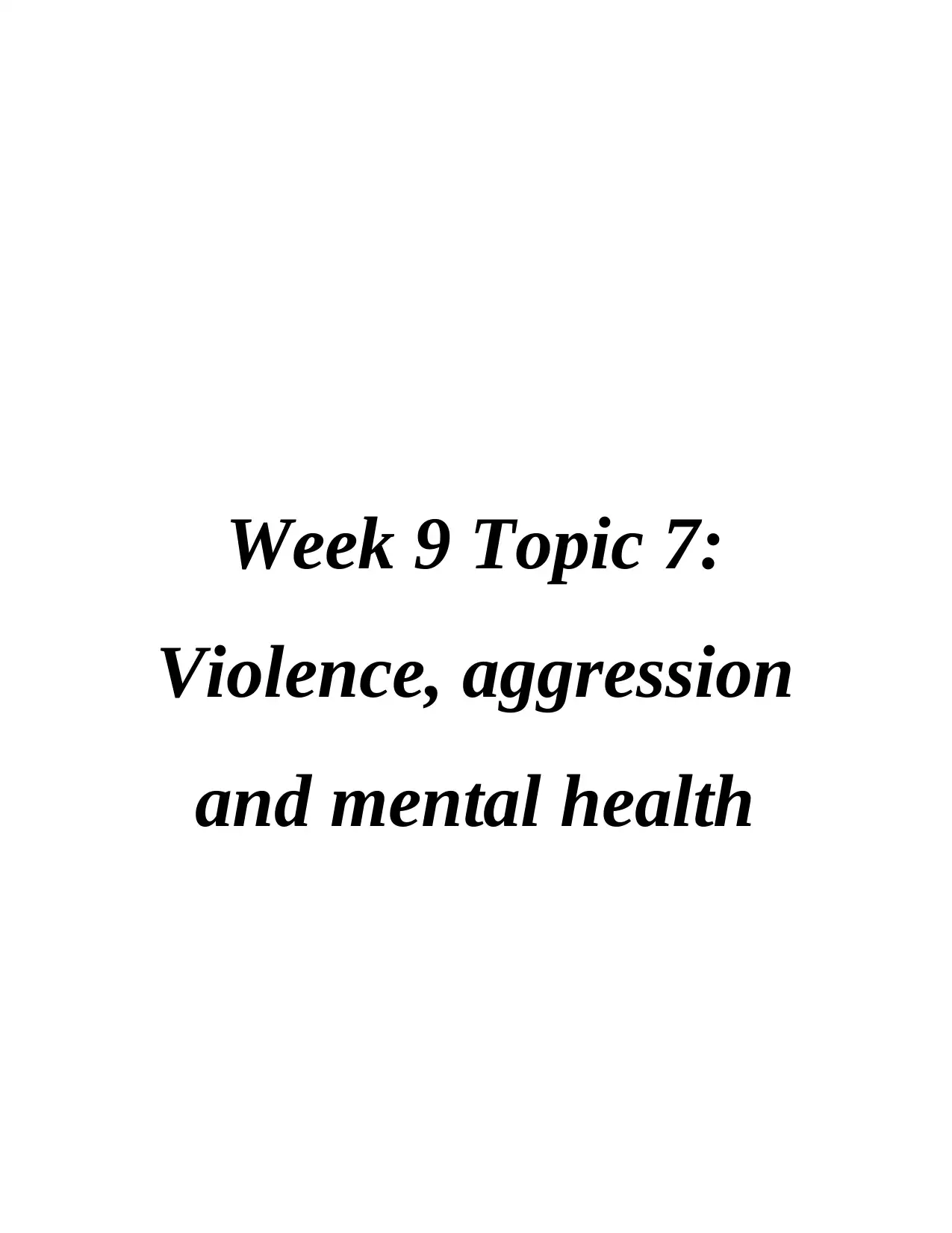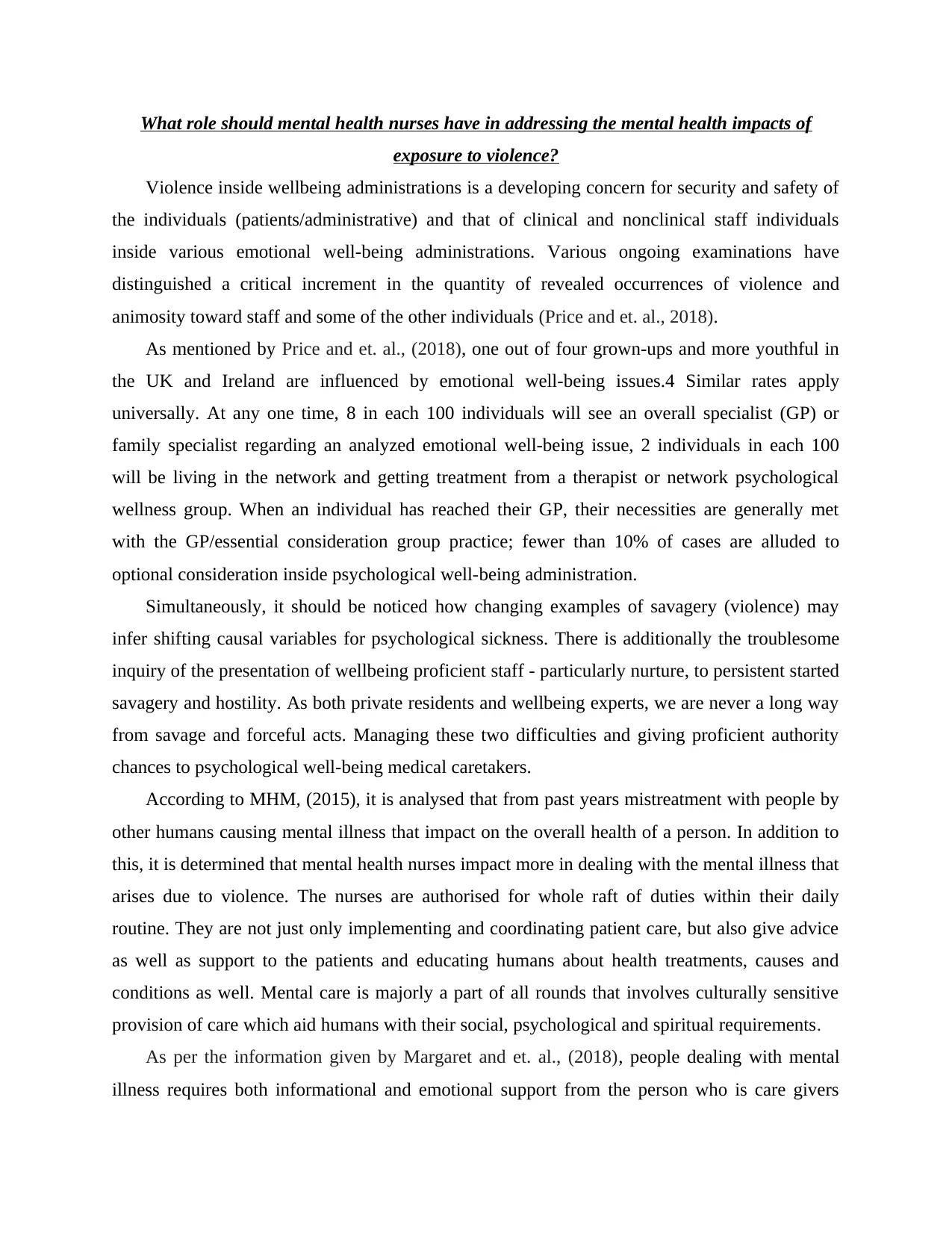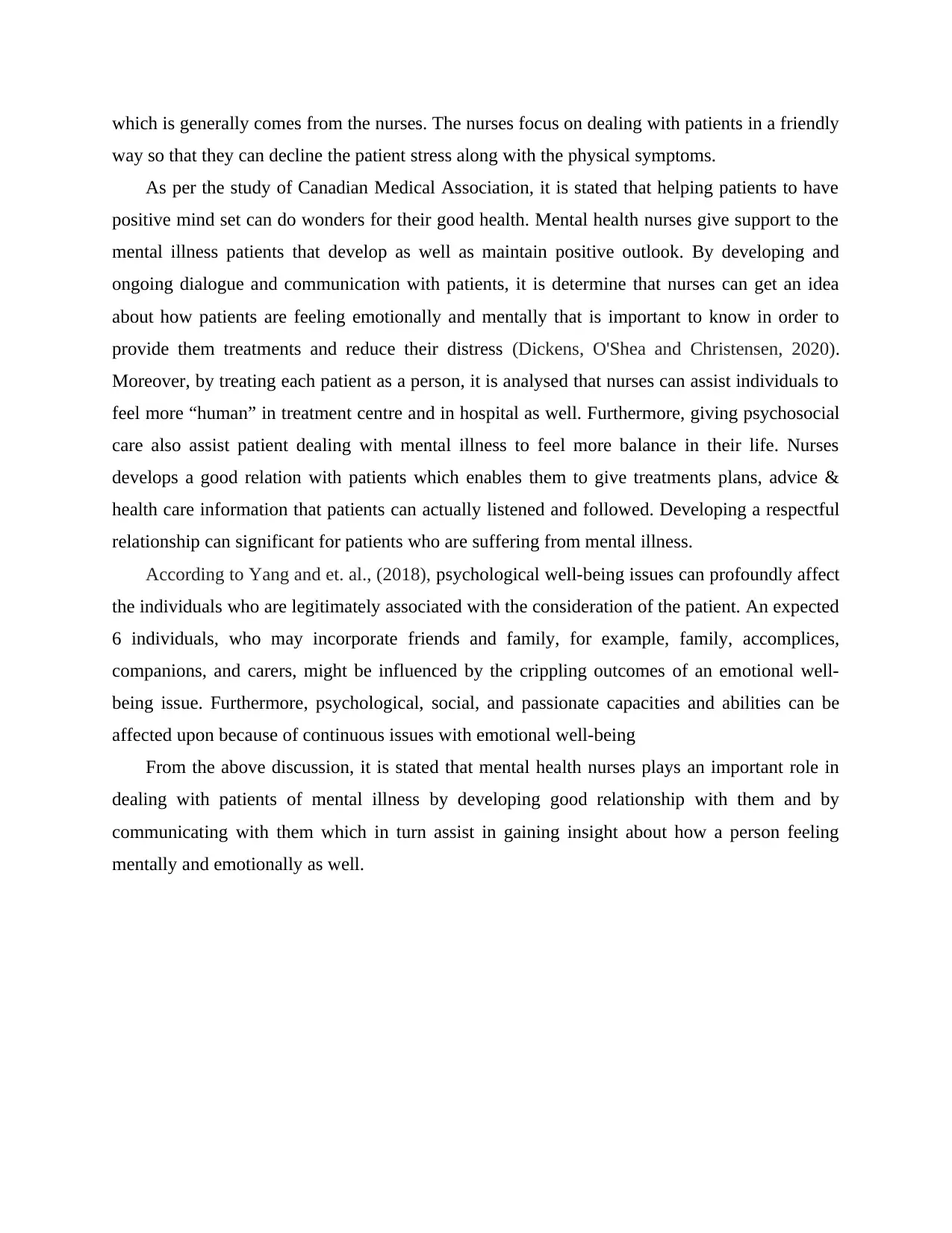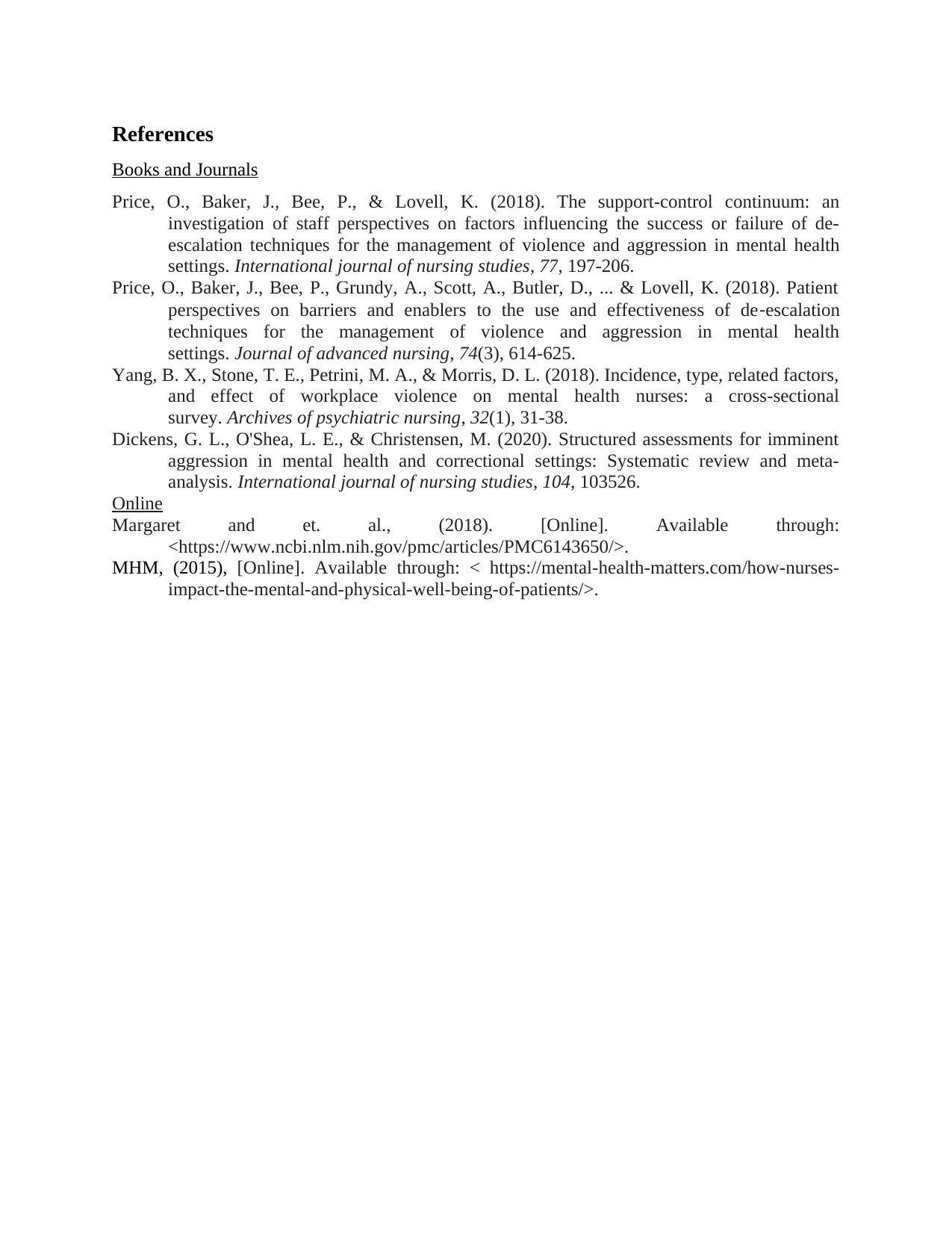The Role of Mental Health Nurses in Violence and Aggression
VerifiedAdded on 2023/01/06
|4
|1125
|56
Essay
AI Summary
This essay examines the significant role of mental health nurses in addressing the mental health consequences of exposure to violence and aggression, a growing concern in healthcare settings. The essay highlights the increasing incidents of violence against staff and patients, emphasizing the impact of violence on mental well-being. It delves into the responsibilities of mental health nurses, including providing patient care, offering emotional and informational support, and developing therapeutic relationships. The essay references studies on de-escalation techniques, patient perspectives, and the effects of workplace violence on nurses. It also explores the importance of psychosocial care, communication, and the development of positive mindsets to improve patient outcomes. The conclusion emphasizes that mental health nurses are essential in supporting patients, and helping them to manage the mental health impacts of violence, including providing treatment plans, advice, and health care information.

Week 9 Topic 7:
Violence, aggression
and mental health
Violence, aggression
and mental health
Paraphrase This Document
Need a fresh take? Get an instant paraphrase of this document with our AI Paraphraser

What role should mental health nurses have in addressing the mental health impacts of
exposure to violence?
Violence inside wellbeing administrations is a developing concern for security and safety of
the individuals (patients/administrative) and that of clinical and nonclinical staff individuals
inside various emotional well-being administrations. Various ongoing examinations have
distinguished a critical increment in the quantity of revealed occurrences of violence and
animosity toward staff and some of the other individuals (Price and et. al., 2018).
As mentioned by Price and et. al., (2018), one out of four grown-ups and more youthful in
the UK and Ireland are influenced by emotional well-being issues.4 Similar rates apply
universally. At any one time, 8 in each 100 individuals will see an overall specialist (GP) or
family specialist regarding an analyzed emotional well-being issue, 2 individuals in each 100
will be living in the network and getting treatment from a therapist or network psychological
wellness group. When an individual has reached their GP, their necessities are generally met
with the GP/essential consideration group practice; fewer than 10% of cases are alluded to
optional consideration inside psychological well-being administration.
Simultaneously, it should be noticed how changing examples of savagery (violence) may
infer shifting causal variables for psychological sickness. There is additionally the troublesome
inquiry of the presentation of wellbeing proficient staff - particularly nurture, to persistent started
savagery and hostility. As both private residents and wellbeing experts, we are never a long way
from savage and forceful acts. Managing these two difficulties and giving proficient authority
chances to psychological well-being medical caretakers.
According to MHM, (2015), it is analysed that from past years mistreatment with people by
other humans causing mental illness that impact on the overall health of a person. In addition to
this, it is determined that mental health nurses impact more in dealing with the mental illness that
arises due to violence. The nurses are authorised for whole raft of duties within their daily
routine. They are not just only implementing and coordinating patient care, but also give advice
as well as support to the patients and educating humans about health treatments, causes and
conditions as well. Mental care is majorly a part of all rounds that involves culturally sensitive
provision of care which aid humans with their social, psychological and spiritual requirements.
As per the information given by Margaret and et. al., (2018), people dealing with mental
illness requires both informational and emotional support from the person who is care givers
exposure to violence?
Violence inside wellbeing administrations is a developing concern for security and safety of
the individuals (patients/administrative) and that of clinical and nonclinical staff individuals
inside various emotional well-being administrations. Various ongoing examinations have
distinguished a critical increment in the quantity of revealed occurrences of violence and
animosity toward staff and some of the other individuals (Price and et. al., 2018).
As mentioned by Price and et. al., (2018), one out of four grown-ups and more youthful in
the UK and Ireland are influenced by emotional well-being issues.4 Similar rates apply
universally. At any one time, 8 in each 100 individuals will see an overall specialist (GP) or
family specialist regarding an analyzed emotional well-being issue, 2 individuals in each 100
will be living in the network and getting treatment from a therapist or network psychological
wellness group. When an individual has reached their GP, their necessities are generally met
with the GP/essential consideration group practice; fewer than 10% of cases are alluded to
optional consideration inside psychological well-being administration.
Simultaneously, it should be noticed how changing examples of savagery (violence) may
infer shifting causal variables for psychological sickness. There is additionally the troublesome
inquiry of the presentation of wellbeing proficient staff - particularly nurture, to persistent started
savagery and hostility. As both private residents and wellbeing experts, we are never a long way
from savage and forceful acts. Managing these two difficulties and giving proficient authority
chances to psychological well-being medical caretakers.
According to MHM, (2015), it is analysed that from past years mistreatment with people by
other humans causing mental illness that impact on the overall health of a person. In addition to
this, it is determined that mental health nurses impact more in dealing with the mental illness that
arises due to violence. The nurses are authorised for whole raft of duties within their daily
routine. They are not just only implementing and coordinating patient care, but also give advice
as well as support to the patients and educating humans about health treatments, causes and
conditions as well. Mental care is majorly a part of all rounds that involves culturally sensitive
provision of care which aid humans with their social, psychological and spiritual requirements.
As per the information given by Margaret and et. al., (2018), people dealing with mental
illness requires both informational and emotional support from the person who is care givers

which is generally comes from the nurses. The nurses focus on dealing with patients in a friendly
way so that they can decline the patient stress along with the physical symptoms.
As per the study of Canadian Medical Association, it is stated that helping patients to have
positive mind set can do wonders for their good health. Mental health nurses give support to the
mental illness patients that develop as well as maintain positive outlook. By developing and
ongoing dialogue and communication with patients, it is determine that nurses can get an idea
about how patients are feeling emotionally and mentally that is important to know in order to
provide them treatments and reduce their distress (Dickens, O'Shea and Christensen, 2020).
Moreover, by treating each patient as a person, it is analysed that nurses can assist individuals to
feel more “human” in treatment centre and in hospital as well. Furthermore, giving psychosocial
care also assist patient dealing with mental illness to feel more balance in their life. Nurses
develops a good relation with patients which enables them to give treatments plans, advice &
health care information that patients can actually listened and followed. Developing a respectful
relationship can significant for patients who are suffering from mental illness.
According to Yang and et. al., (2018), psychological well-being issues can profoundly affect
the individuals who are legitimately associated with the consideration of the patient. An expected
6 individuals, who may incorporate friends and family, for example, family, accomplices,
companions, and carers, might be influenced by the crippling outcomes of an emotional well-
being issue. Furthermore, psychological, social, and passionate capacities and abilities can be
affected upon because of continuous issues with emotional well-being
From the above discussion, it is stated that mental health nurses plays an important role in
dealing with patients of mental illness by developing good relationship with them and by
communicating with them which in turn assist in gaining insight about how a person feeling
mentally and emotionally as well.
way so that they can decline the patient stress along with the physical symptoms.
As per the study of Canadian Medical Association, it is stated that helping patients to have
positive mind set can do wonders for their good health. Mental health nurses give support to the
mental illness patients that develop as well as maintain positive outlook. By developing and
ongoing dialogue and communication with patients, it is determine that nurses can get an idea
about how patients are feeling emotionally and mentally that is important to know in order to
provide them treatments and reduce their distress (Dickens, O'Shea and Christensen, 2020).
Moreover, by treating each patient as a person, it is analysed that nurses can assist individuals to
feel more “human” in treatment centre and in hospital as well. Furthermore, giving psychosocial
care also assist patient dealing with mental illness to feel more balance in their life. Nurses
develops a good relation with patients which enables them to give treatments plans, advice &
health care information that patients can actually listened and followed. Developing a respectful
relationship can significant for patients who are suffering from mental illness.
According to Yang and et. al., (2018), psychological well-being issues can profoundly affect
the individuals who are legitimately associated with the consideration of the patient. An expected
6 individuals, who may incorporate friends and family, for example, family, accomplices,
companions, and carers, might be influenced by the crippling outcomes of an emotional well-
being issue. Furthermore, psychological, social, and passionate capacities and abilities can be
affected upon because of continuous issues with emotional well-being
From the above discussion, it is stated that mental health nurses plays an important role in
dealing with patients of mental illness by developing good relationship with them and by
communicating with them which in turn assist in gaining insight about how a person feeling
mentally and emotionally as well.
⊘ This is a preview!⊘
Do you want full access?
Subscribe today to unlock all pages.

Trusted by 1+ million students worldwide

References
Books and Journals
Price, O., Baker, J., Bee, P., & Lovell, K. (2018). The support-control continuum: an
investigation of staff perspectives on factors influencing the success or failure of de-
escalation techniques for the management of violence and aggression in mental health
settings. International journal of nursing studies, 77, 197-206.
Price, O., Baker, J., Bee, P., Grundy, A., Scott, A., Butler, D., ... & Lovell, K. (2018). Patient
perspectives on barriers and enablers to the use and effectiveness of de‐escalation
techniques for the management of violence and aggression in mental health
settings. Journal of advanced nursing, 74(3), 614-625.
Yang, B. X., Stone, T. E., Petrini, M. A., & Morris, D. L. (2018). Incidence, type, related factors,
and effect of workplace violence on mental health nurses: a cross-sectional
survey. Archives of psychiatric nursing, 32(1), 31-38.
Dickens, G. L., O'Shea, L. E., & Christensen, M. (2020). Structured assessments for imminent
aggression in mental health and correctional settings: Systematic review and meta-
analysis. International journal of nursing studies, 104, 103526.
Online
Margaret and et. al., (2018). [Online]. Available through:
<https://www.ncbi.nlm.nih.gov/pmc/articles/PMC6143650/>.
MHM, (2015), [Online]. Available through: < https://mental-health-matters.com/how-nurses-
impact-the-mental-and-physical-well-being-of-patients/>.
Books and Journals
Price, O., Baker, J., Bee, P., & Lovell, K. (2018). The support-control continuum: an
investigation of staff perspectives on factors influencing the success or failure of de-
escalation techniques for the management of violence and aggression in mental health
settings. International journal of nursing studies, 77, 197-206.
Price, O., Baker, J., Bee, P., Grundy, A., Scott, A., Butler, D., ... & Lovell, K. (2018). Patient
perspectives on barriers and enablers to the use and effectiveness of de‐escalation
techniques for the management of violence and aggression in mental health
settings. Journal of advanced nursing, 74(3), 614-625.
Yang, B. X., Stone, T. E., Petrini, M. A., & Morris, D. L. (2018). Incidence, type, related factors,
and effect of workplace violence on mental health nurses: a cross-sectional
survey. Archives of psychiatric nursing, 32(1), 31-38.
Dickens, G. L., O'Shea, L. E., & Christensen, M. (2020). Structured assessments for imminent
aggression in mental health and correctional settings: Systematic review and meta-
analysis. International journal of nursing studies, 104, 103526.
Online
Margaret and et. al., (2018). [Online]. Available through:
<https://www.ncbi.nlm.nih.gov/pmc/articles/PMC6143650/>.
MHM, (2015), [Online]. Available through: < https://mental-health-matters.com/how-nurses-
impact-the-mental-and-physical-well-being-of-patients/>.
1 out of 4
Related Documents
Your All-in-One AI-Powered Toolkit for Academic Success.
+13062052269
info@desklib.com
Available 24*7 on WhatsApp / Email
![[object Object]](/_next/static/media/star-bottom.7253800d.svg)
Unlock your academic potential
Copyright © 2020–2026 A2Z Services. All Rights Reserved. Developed and managed by ZUCOL.





